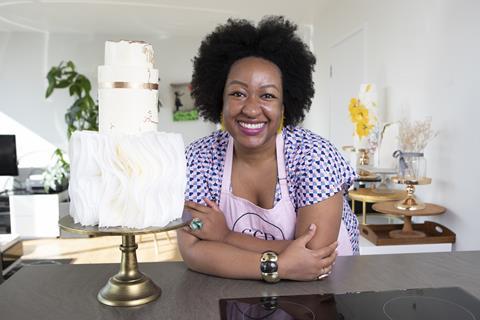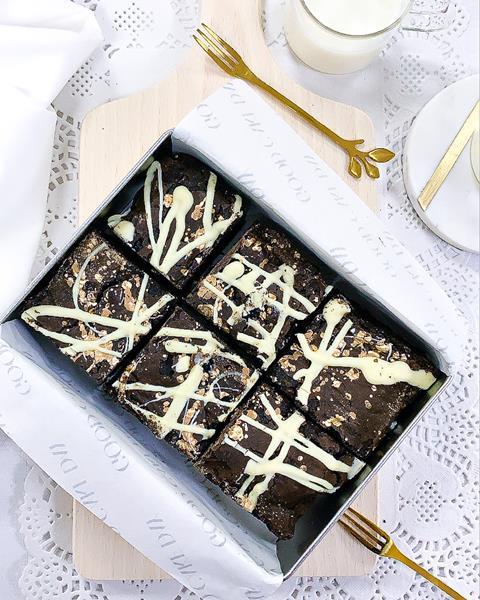Alex Noel spoke with Chinelo Awa about the rise of her cake business, and how God brought it back to life after a challenging period

Chinelo Awa is the founder of Good Cake Day, a luxury cake business based in London that specialises in delicious brownies and show-stopper cakes for special occasions. When we speak on the phone she is – appropriately – in her bakery, making cakes. In the background I can hear the sound of oven doors opening and closing, and kitchenware being put away.
She tells me how she got the business up and running in 2018: “I crowdfunded to buy my first mixer, which I still have to this day. I’ve literally just used it now to make a cake.” The name came to her one day in church: “I just felt ‘Good Cake Day’. Quite frankly I was convinced it must be taken because of it being so ‘on the nose’. But no one had it! So obviously I registered everything I could. I took all the domains; I paid for everything.”
The beginnings of a business
Chinelo grew up in Nigeria, living between Owerri and Port Harcourt – where she was at school. An only child, she was especially close to her single mother. Faith was always a central part of her life but she became “a Christian for myself” at 13. She moved to the UK for university, doing three degrees, “well, technically four” in law and business. Next, it was time to get a job: “I was like, OK enough! Nobody needs this many degrees.”
Working in her first role as a paralegal in a law firm made her reflect on what she really wanted. Despite her mother being a lawyer and the expectation being that she would become the same, she decided against it. “I came to the conclusion that I wanted flexibility. I figured the best way to do that was to have a business. I couldn’t think of anything I was particularly good at but I figured: ‘Well, I like cake. So, I’ll just learn how to make cake.’”
After the killing of George Floyd “a lot of people started looking for black-owned businesses to support
And that she did – finding resourceful and entrepreneurial ways to learn on the cheap. These included bringing her favourite experts to London (sometimes from as far afield as Australia), where she would host them and run masterclasses; charging people to attend them while she got to learn too. For the first three and half years she ran the business on the side; doing a few cake orders a month and organising the masterclasses. “I would go to work in the morning, I’d come back, make a cake. Or wake up really early in the morning, bake a cake, come back from work, decorate it and deliver it the next day. And that was pretty much my business model.”

A bumpy road
Events in 2020 raised her profile, as Chinelo recognises that after the killing of George Floyd “a lot of people started looking for black-owned businesses to support. Then orders starting coming, and I started to get press mentions.” She didn’t know how long this support would last, but believed God was telling her to go full time: “I just took the plunge and it seemed as though that decision was rewarded. Shortly afterwards I got a huge order from Google. It was an incredibly busy Christmas; I’ve never made that many brownies.” It felt like confirmation: “I thought clearly this is what God wants me to do.”
The following summer, in 2021, Chinelo hosted four sold-out masterclasses. But her cake orders started to peter out and, despite money coming into the business, unforeseen costs meant she wasn’t making any profit. In fact, she was losing money: “I didn’t even break even at the end of that experience.” As her debts began to mount, the stress and anxiety became too much: “It got so bad that every other morning I was waking up with vertigo. It would feel like someone was just flinging me around in a circle.”
A trip to the States during Christmas provided time to rest and figure things out: “Going into 2022 I planned to quit as soon as possible. I would keep the doors open up until I was able to get a job and then I would close down the business.”
By November I was like, “the business is actually no longer viable and the ship’s basically going down”
Back in the UK, she turned her attention to job applications, sending up to 20 CVs a day. But no job offers came in, and Good Cake Day continued to flounder: “By November I was like, ‘the business is actually no longer viable and the ship’s basically going down’.” The first half of 2023 brought more of the same: “By June it felt like I was tearing my hair out.” She felt like a failure and had lost sight of God’s goodness altogether.
This was further compounded by a devastating loss she was still processing (the death of her mum in 2018): “I suppose I was receiving failure harder than I would have, if I wasn’t also fighting grief.” With the loss coinciding closely with setting up Good Cake Day, the business had been her lifeline during grief: “It was how I was holding onto life; my business was now my identity because this was the one thing that I was doing that kept me on earth.” While all else seemed lost, it saved her by giving her the purpose she needed: “At least I had this one thing that I could nurture and pour love into my business. So, part of my feeling of failure was that I couldn’t save it back.”

Healing and restoration
Through this difficult period God started to heal and transform her, and on the other side she found a new approach to life and business – as a child of God. “Things started to change; I was still struggling, but I was no longer struggling by myself where I felt like I had to figure everything out on my own – I started praying about things.” She felt encouraged to carry on: “I started getting orders again – little by little.”
Buoyed by these signs of hope, she changed her business model: “I really wanted corporate clients, because I thought that’s the way out of this. They pay you in bulk; it’s usually more lucrative as the bread-and-butter portion of the business can be corporatised and the individual orders can just be extra. I wrote down a list of different companies that I’d like to work with and had it in my head that this is what I wanted.”
She designed a corporate brochure but did little else. Shortly after, she was given a year’s membership to a platform promoting black-owned businesses, and in a matter of months was invited to exhibit at several food and craft events in London. These introduced her to the corporate clients she wanted; which included music and media companies and big-name brands. “I had started the process – I had done the brochure but I hadn’t followed through; now I was getting corporate invitations that I didn’t even apply for.”
The icing on the cake was an invitation to work with Disney. Initially it took her by surprise; “I’m just like, wait, what?! Then I found the list with the companies I wanted to work with and Disney was my first company.” She was amazed: “The number of times I’ve just dropped to my knees and said ‘God, thank you.’ I don’t know how to tell this story without God.”
Both Chinelo and her business are bouncing back; not only has she been able to clear her debts, but she’s also begun to dream about the future. She reflects on the last few years: “my business can become for others what it was for me. God can take this thing that was actually born out of my sorrow and use it to bring joy into people’s lives.”
She now prays whenever she sends out her orders, and is thrilled when she hears of how Good Cake Day has touched people’s hearts. She explains her interactions with one customer: “this is something that in a difficult time brought joy to her and helped her know that her friend loved her and was thinking of her…when she was in a position to share that same love with someone else she came back to me to do that. And really that’s the whole point of what I’m trying to do.”
To spread some joy with Chinelo’s cakes, go to GoodCakeDay.com

































No comments yet